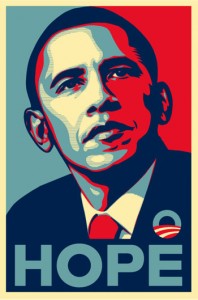A quick heads up…
Flumotion and the Open Video Alliance will be streaming a live event on Thursday, February 25th featuring Lawrence Lessig, the foundational voice of the free culture movement. The 45-minute speech will be delivered live from Harvard Law School via Flumotion’s Streaming Platform, and will explore the relationship between copyright, fair use, politics and online video. The speech takes place at 6:00 PM local time (23:00 GMT) and [can be watched live here.]
Get more details from Flumotion here.
PS On a related note, TEDxNYED will stream talks live on March 6th. Speakers will include Lawrence Lessig, Henry Jenkins, Jeff Jarvis, Michael Wesch and others. Looks like a great event. Get more details here.
 By now, everyone knows the famous Obama “Hope” poster produced by Shepard Fairey. Recently, Fairey has acknowledged that the poster was originally inspired by a photograph belonging to the AP Press, and now the AP is claiming that Fairey has infringed on its copyright and wants “payment for the use of the photo and a portion of any money he makes from it.” (see article in
By now, everyone knows the famous Obama “Hope” poster produced by Shepard Fairey. Recently, Fairey has acknowledged that the poster was originally inspired by a photograph belonging to the AP Press, and now the AP is claiming that Fairey has infringed on its copyright and wants “payment for the use of the photo and a portion of any money he makes from it.” (see article in 
